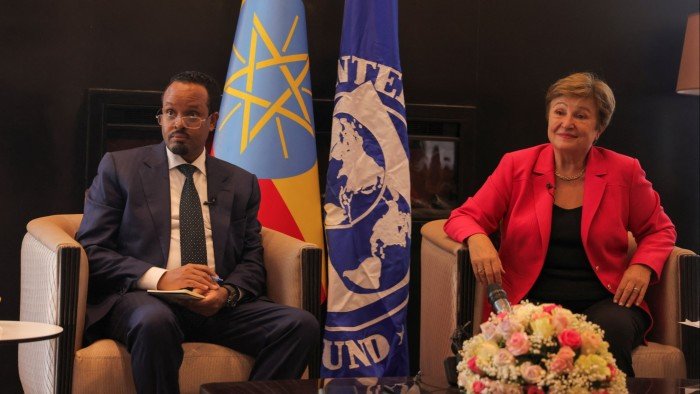Unlock the Editor’s Digest for free
Roula Khalaf, Editor of the FT, selects her favourite stories in this weekly newsletter.
Investors in Ethiopia’s defaulted dollar bond have accused the IMF of exaggerating how much debt relief the country needs, arguing that a surge in gold and coffee exports have restored the finances of east Africa’s most populous country to a sounder footing.
A committee of holders of the $1bn debt said the fund was undermining talks to end a 2023 default after it “significantly undervalued” a rebound in exports since Ethiopia devalued its currency against the dollar last year, according to a statement seen by the Financial Times.
The committee accused the fund of attempting to “reverse-engineer” debt relief as part of a $3.4bn bailout and also said it was reserving legal rights over the debt after it rejected a proposal by Ethiopia to write down the bond last year.
The dispute reflects one of the biggest faultlines to resolving a wave of sovereign defaults from Sri Lanka to Zambia in recent years, as investors have increasingly criticised how the IMF oversees key debt relief targets. While the fund is never directly involved in debt restructuring talks between governments and bondholders, its economic forecasts strongly influence negotiations.
The IMF said last month that “Ethiopia’s debt continues to be unsustainable and in distress”, a view the committee disputes.
The IMF’s projections for Ethiopia “artificially imply a solvency issue which requires Ethiopia to seek greater concessions from its stakeholders in order to meet the IMF’s lending criteria than, in our view, are actually required to achieve debt sustainability”, the committee said.
The committee, which owns 40 per cent of the Ethiopian bond, includes hedge funds Farallon Capital Management and VR Capital, people familiar with the matter said.
The IMF did not immediately respond to a request for comment. The fund conditioned last year’s bailout on the devaluation of Ethiopia’s currency, the birr, and is backing other reforms. Kristalina Georgieva, IMF managing director, visited Addis Ababa earlier this month.
In October, the bondholder committee turned down an offer to cut the debt’s face value by 18 per cent, after the legacy of a two-year civil war led Ethiopia to skip interest payments in 2023.
Most of Ethiopia’s roughly $30bn external debt is owed to multilateral creditors, or individual countries such as China, that are seen as less willing to accept outright losses. But the IMF’s bailout is requiring debt to be reduced relative to exports.
During Georgieva’s visit, Ahmed Shide, Ethiopia’s finance minister, said the country was in “the final stage of negotiations” with its creditors. The fund has said that the country is getting closer to a deal with its bilateral lenders.
After the birr’s peg to the dollar was dropped in July, exports doubled year on year to more than $3bn in the second half of 2024, while imports fell slightly to $8.6bn over the same period, Ethiopia’s central bank said last week.
Coffee exports from Africa’s largest producer rose by 60 per cent to nearly $1bn, while gold exports surged more than 700 per cent to $1.3bn.
In an update last month, IMF staff acknowledged that Ethiopia’s exports would be “slightly stronger” in the near term, but added that medium-term projections of exports of goods and services would stay unchanged, at about 9 to 10 per cent of GDP.
The boom in coffee exports followed a sharp rise in global prices as well as the currency shift, while the rise in gold exports had reflected “previously smuggled production moving to official channels,” it added.
UK and African think-tanks Debt Justice, the Horn Economic and Social Policy Institute, and Afrodad argued in a recent paper that bondholders could have made returns of a third if they accepted Ethiopia’s so-called haircut last year.
This was based on the assumption of investors buying the bonds at their average price of 67 cents on the dollar between 2022 and 2024.
“Bondholders rejected an extremely generous deal. It allowed them to still make a profit and required bilateral creditors to be repaid significantly less for debt sustainability targets to be met,” Tim Jones, policy director at Debt Justice, said.
“Bondholders are right to criticise the IMF’s export forecasts for Ethiopia, but it should be because they are extremely optimistic” compared with the historical average, Jones added.
The bondholder committee has also taken issue with the IMF allowing Ethiopia to negotiate a loan on commercial terms to complete the country’s second-largest hydropower dam while it is still in default on the bond.
At nearly $1bn, the size of the IMF’s allowance for the loan to be excluded from a bailout restriction on commercial borrowing is “rare in the context of low-income countries”, and Ethiopia should disclose the terms of the dam financing, the committee said.




